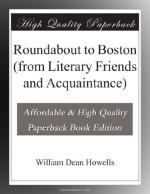Besides my old Ohio-time friend Moncure D. Conway, who paid us a visit, and in his immediate relations with literary Boston seemed to bring the mountain to Mahomet, I saw no one else more literary than Henry Ward Beecher. He was passing through Venice on his way to those efforts in England in behalf of the Union which had a certain great effect at the time; and in the tiny parlor of our apartment on the Grand Canal, I can still see him sitting athletic, almost pugilistic, of presence, with his strong face, but kind, framed in long hair that swept above his massive forehead, and fell to the level of his humorously smiling mouth. His eyes quaintly gleamed at the things we told him of our life in the strange place; but he only partly relaxed from his strenuous pose, and the hands that lay upon his knees were clinched. Afterwards, as he passed our balcony in a gondola, he lifted the brave red fez he was wearing (many people wore the fez for one caprice or another) and saluted our eagle and us: we were often on the balcony behind the shield to attest the authenticity of the American eagle.
III.
Before I left Venice, however, there came a turn in my literary luck, and from the hand I could most have wished to reverse the adverse wheel of fortune. I had labored out with great pains a paper on recent Italian comedy, which I sent to Lowell, then with his friend Professor Norton jointly editor of the North American Review; and he took it and wrote me one of his loveliest letters about it, consoling me in an instant for all the defeat I had undergone, and making it sweet and worthy to have lived through that misery. It is one of the hard conditions of this state that while we can mostly make out to let people taste the last drop of bitterness and ill-will that is in us, our love and gratitude are only semi-articulate at the best, and usually altogether tongue-tied. As often as I tried afterwards to tell Lowell of the benediction, the salvation, his letter was to me, I failed. But perhaps he would not have understood, if I had spoken out all that was in me with the fulness I could have given a resentment. His message came after years of thwarted endeavor, and reinstated me in the belief that I could still do something in literature. To be sure, the letters in the Advertiser had begun to make their impression; among the first great pleasures they brought me was a recognition from my diplomatic chief at Vienna; but I valued my admission to the North American peculiarly because it was Lowell let me in, and because I felt that in his charge it must be the place of highest honor. He spoke of the pay for my article, in his letter, and asked me where he should send it, and I answered, to my father-in-law, who put it in his savings-bank, where he lived, in Brattleboro, Vermont. There it remained, and I forgot all about it, so that when his affairs were settled some years later and I was notified that there was a sum to my credit in the bank, I said, with the confidence I have nearly always felt when wrong, that I had no money there. The proof of my error was sent me in a check, and then I bethought me of the pay for “Recent Italian Comedy.”




